Acting on the desire to pivot can be a fulfilling, motivating, yet life-changing decision not to be taken lightly. According to Harvard Business Review, career pivots have become more common than ever. There is no perfect time or age for a pivot to take place, but many psychological or contextual factors can influence the decision. When transitioning into a new department or starting your own business venture, navigating a professional pivot can be challenging in finding a balance between passion, performance, and experimentation.
Whether you choose to leap confidently into a career change or begin the hard work in the background until you feel ready to step into your own power, these power women have all navigated pivots at some point in their careers.
Nicole Gibbons, Founder and CEO of CLARE Paint, Interior Designer
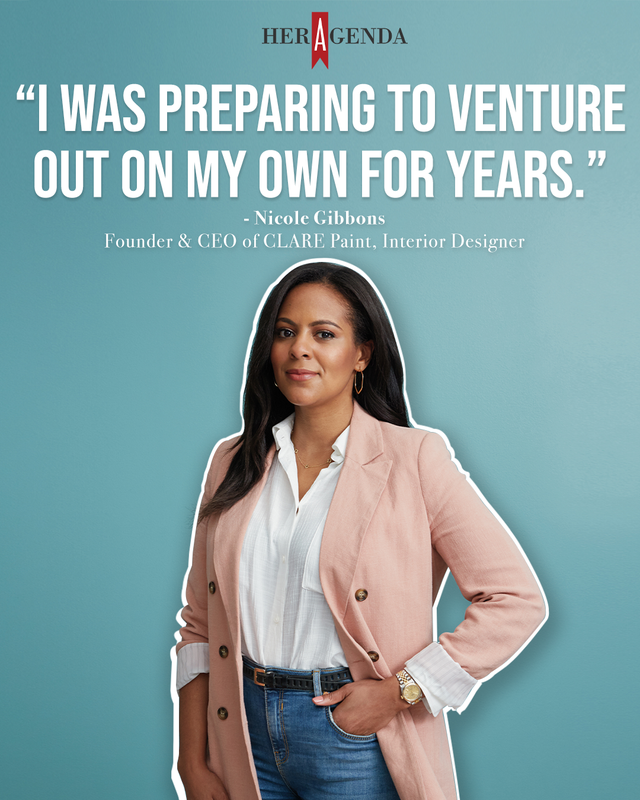
Often, the key to a successful pivot is knowing when to take the leap. Nicole Gibbons shares her experience of starting a side hustle while remaining in her full-time PR role. Although this was a slower way of creating change, the energy, strategy, and understanding she gained throughout this process made her feel ready for the transition.
“While I was working in PR, I started a lifestyle blog in 2008 and didn’t leave [the PR industry] until 2013. I was doing my blog and my side hustle design stuff for five years. So, this was more of a process than a transition. I worked really hard building my confidence, learning the craft, and rode out the recession since I wasn’t willing to leave my day job during that time. It was a slower, more thoughtful, and strategic process. By the time 2013 rolled around, I was just ready. I was really prepared and saved up money in case it took a while to take things off the ground. Even though I had that job, I was preparing to venture out on my own for years.”
L’Oréal Thompson Payton, Author, Journalist and Speaker
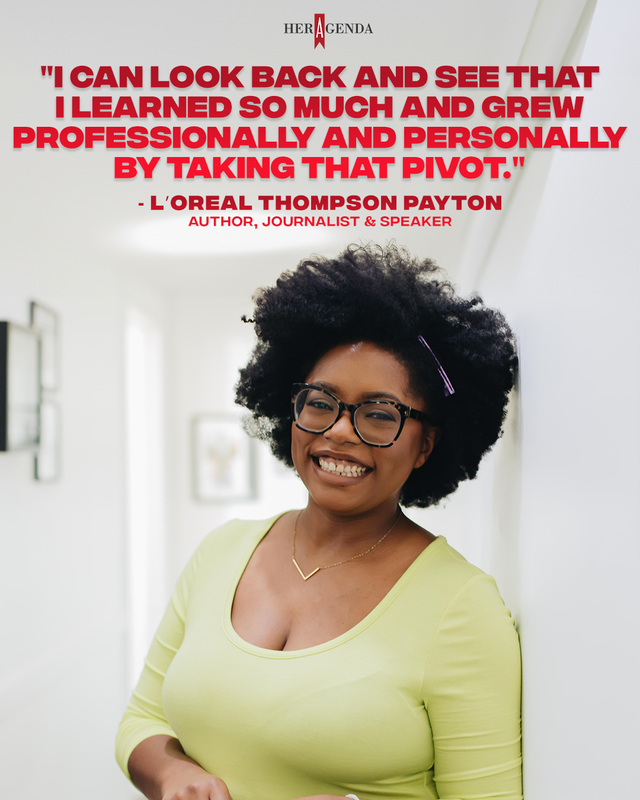
Journalist L’Oréal Thompason Payton openly describes the fear and insecurity she faced when pivoting away from the non-profit industry. Motivation for change can come from an unexpected lack of satisfaction once you have reached a career goal you have actively worked towards. Redefining your career can be nerve-wracking but equally encourages an opportunity for growth.
“The whole journey was very daunting. I felt at the time like I was giving up on those media dreams that I had as a 16-year-old. Now, I can look back and see that I learned so much and grew professionally and personally by taking that pivot. When I was growing up, it was very much like the goal is to get to the top. What I found was that the closer I got to the top, the more that I was like ‘This ain’t it’. Writing has always been my love and passion. So I left the education nonprofit and did freelance writing full-time before landing at Fortune, but it was all to get back to that purpose and my mission of being a writer.”
Rakia Reynolds, Founder and Executive Officer of Skai Blue Media
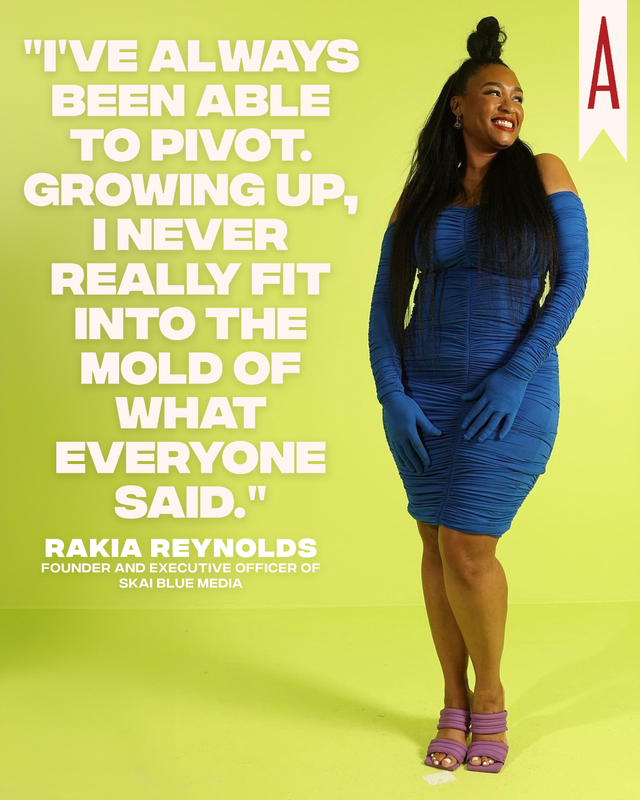
Rakia Reynolds pivoted from psychology to TV by deploying her transferable skills. She attributes her success to surrounding herself with those positioned as experts to facilitate her learning process.
“I’ve always been able to pivot. Growing up, I never really fit into the mold of what everyone said. I was so used to saying, ‘Okay, that doesn’t work. Now, let me move on to that. That doesn’t work, I’ll move on to that.’ All of those things were transferable skills. You can always center yourself around learning, receiving information, and listening to people so that you are better equipped to speak and be an expert.”
Kara Barnett, Creative Director, Netflix Strong Black Lead
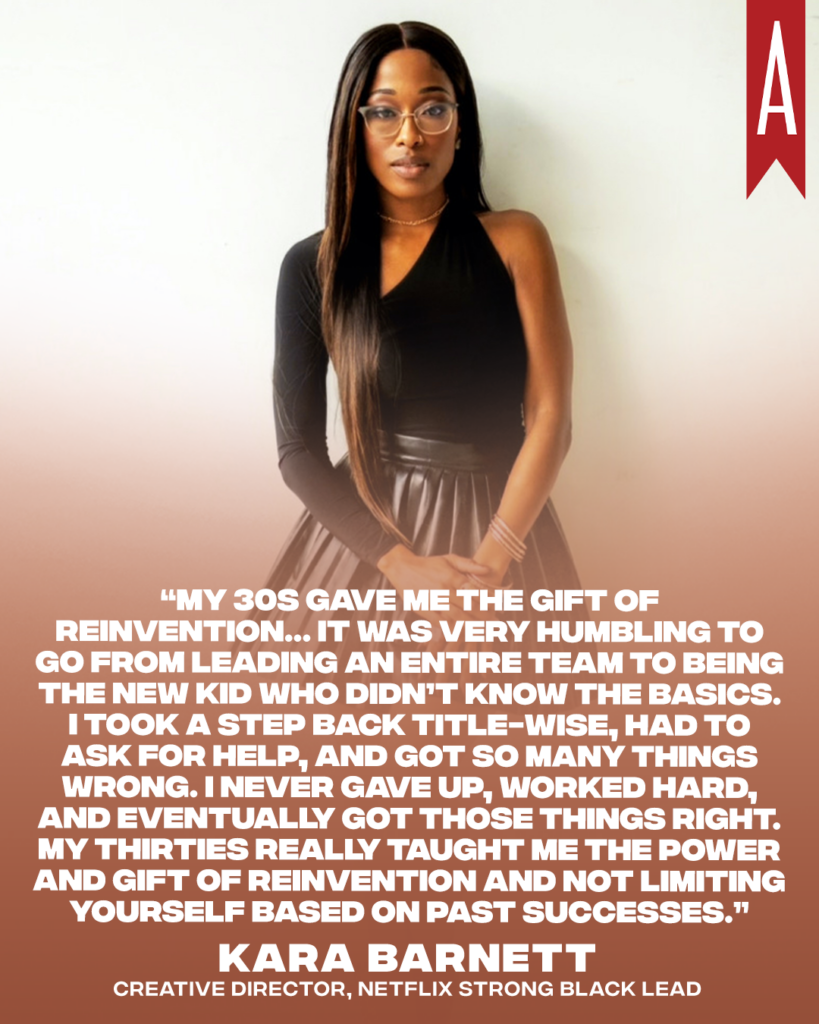
One of the toughest parts of pivoting is embracing reinvention by letting go of your previous professional identity. Moving away from TV to pursue digital media, Kara Barnett describes discovering a new sense of purpose in her thirties. She acknowledges a key part of her pivot involved taking a step backward in order to work toward where she aspired to be.
“My 30s gave me the gift of reinvention…It was very humbling to go from leading an entire team to being the new kid who didn’t know the basics. I took a step back title-wise, had to ask for help, and got so many things wrong. I never gave up, worked hard, and eventually got those things right. My thirties really taught me the power and gift of reinvention and not limiting yourself based on past successes.”
Natasha S. Alford, VP of Digital Content for theGrio, Anchor for theGrio TV, CNN Political Analyst
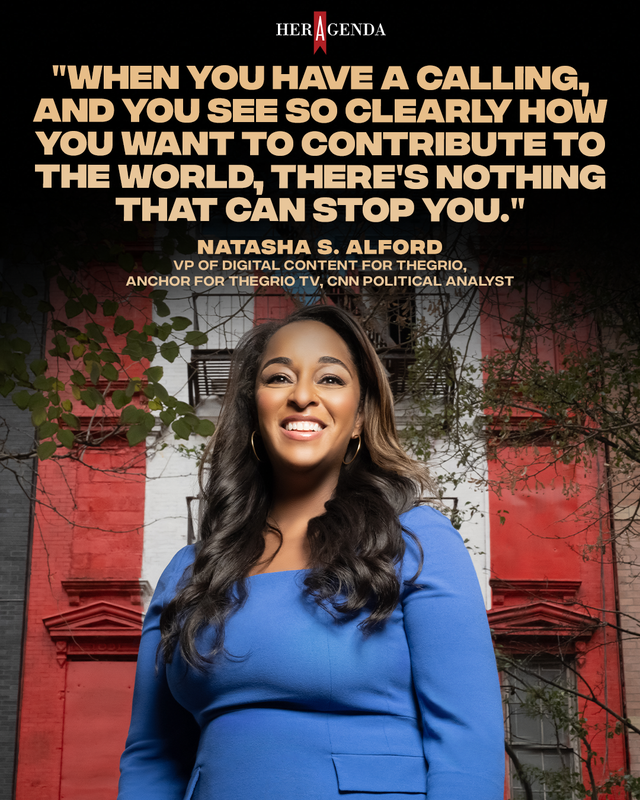
Working at a hedge fund before pivoting to journalism, Natasha S. Alford describes being forced to overcome the external resistance stemming from her network, which amplified her personal fears.
“The reaction was, ‘How are you going to start all over?” ‘You’re not going to make any money.’ ‘Journalism has changed.’ And, ‘If you start all over, you’re gonna have to start at the bottom.’ So, there was a lot of fear that I encountered that was external.
It was others, perhaps out of a protective instinct, or just reacting with what they heard, who tried to dissuade me from doing it. But again, when you have a calling, and you see so clearly how you want to contribute to the world, there’s nothing that can stop you. Sometimes you have to incubate and protect your dream a bit before you share it with a ton of people.
We’re not a generation that goes to one job and stays there for 20 years, this is a changing world. It is okay to be in pursuit [and] it is okay to be a bit of a wanderer if you’re doing so, knowing that you’re trying to get closer and closer to who you truly are.”
Joy Ofodu, Professional Voice Actor, Creator
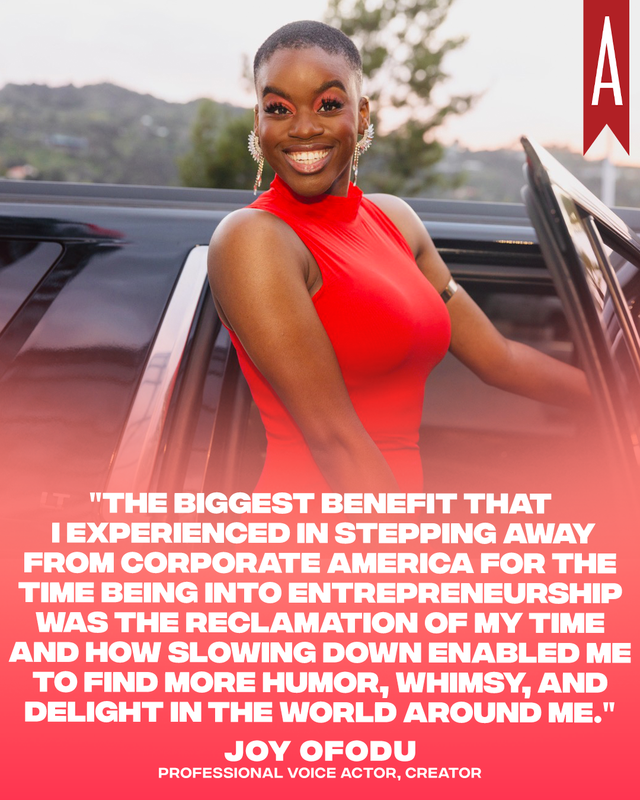
Joy Ofodu credits her successful pivot from corporate to creator to taking a break. Embracing the opportunity to step back from work you are doing or the field you are in can inspire you and help to identify the pathway to pivot without distraction.
“The biggest benefit that I experienced in stepping away from corporate America for the time being into entrepreneurship was the reclamation of my time and how slowing down enabled me to find more humor, whimsy, and delight in the world around me.
If you’re in corporate America, it’s not that you can fully step away. All it took for me was a one month break while I was still working to be inspired enough to make my exit plan.”
Debbie Douglas, Talent Acquisition Lead at Paramount, Author
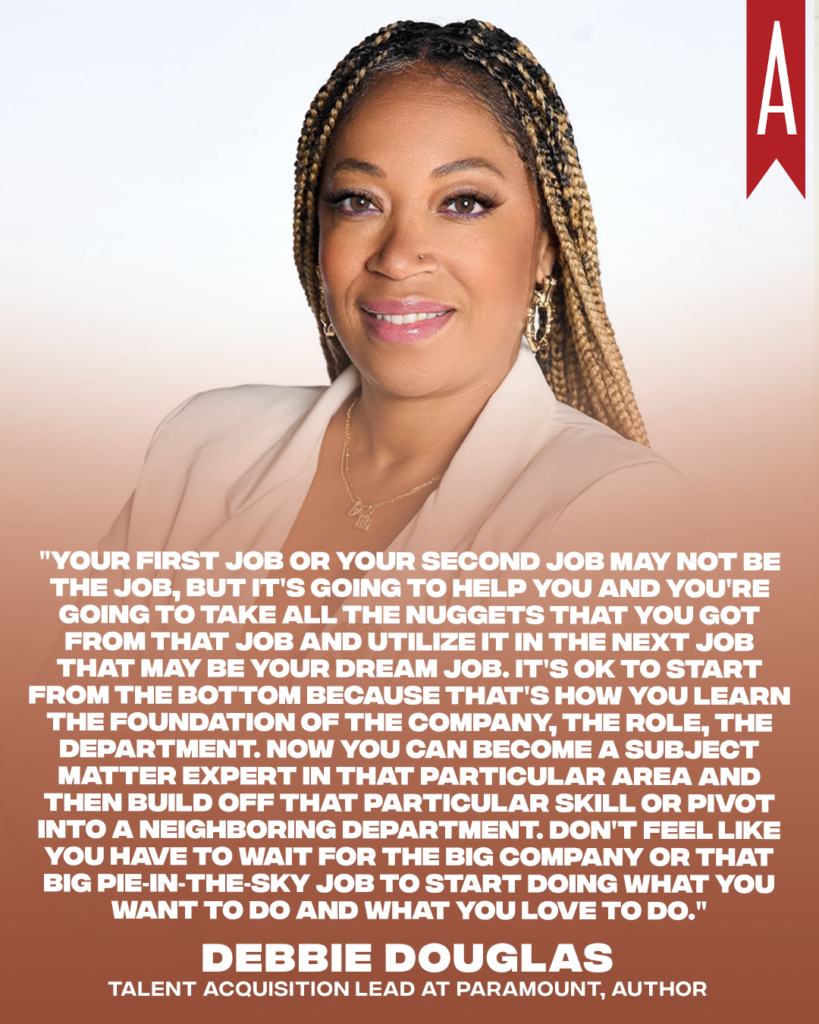
Author of ‘Now What? 12 Strategies To Landing The Career You’ll Love, Not Tolerate,’ Debbie Douglas’ advice encourages individuals to see the value and experience gained in every role, even if that means working your way upward and building new skills.
“Your first job or your second job may not be the job, but it’s going to help you and you’re going to take all the nuggets that you got from that job and utilize it in the next job that may be your dream job. it’s ok to start from the bottom because that’s how you learn the foundation of the company, the role, the department. Now you can become a subject matter expert in that particular area and then build off that particular skill or pivot into a neighboring department. Don’t feel like you have to wait for the big company or that big pie-in-the-sky job to start doing what you want to do and what you love to do.”
Joy Marcus, Co-Founder and General Partner of The 98, Lecturer at Princeton University’s School of Engineering
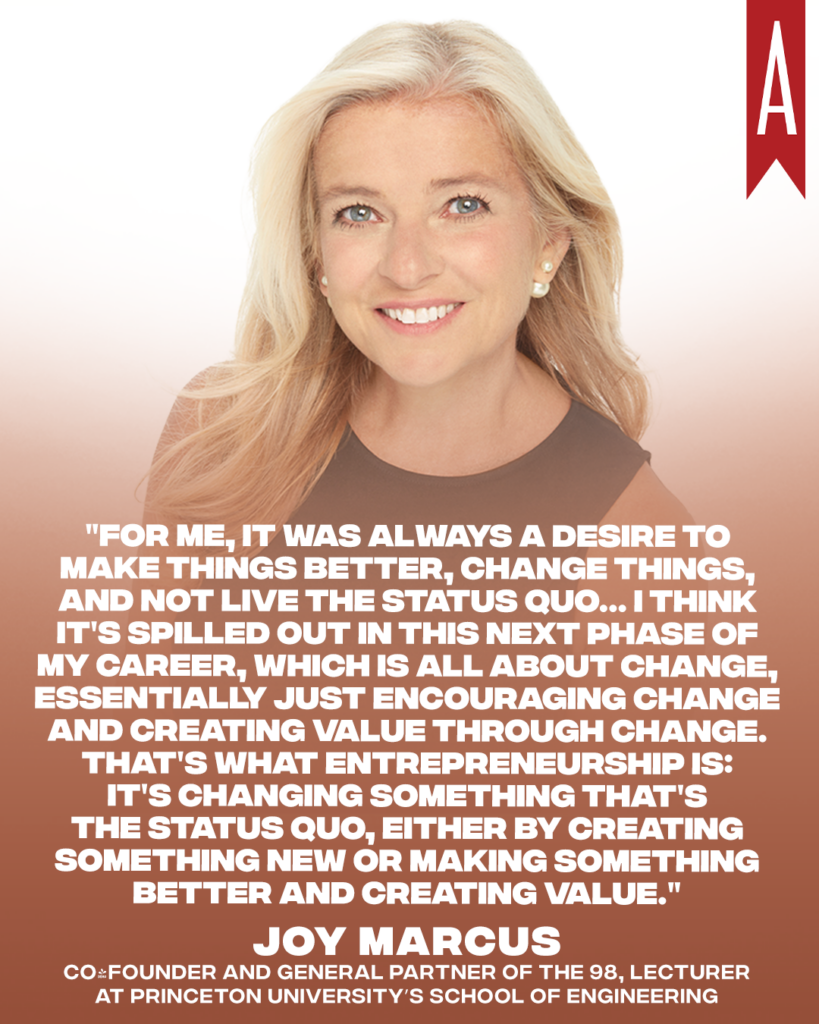
Spending twenty-five years in digital media and commerce before transitioning into venture capitalism, Joy Marcus describes the importance of embracing change when navigating entrepreneurship. “For me, it was always a desire to make things better, change things, and not live the status quo… I think it’s spilled out in this next phase of my career, which is all about change, essentially just encouraging change and creating value through change. That’s what entrepreneurship is: it’s changing something that’s the status quo, either by creating something new or making something better and creating value.”.








